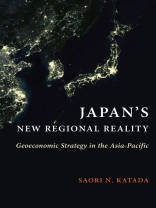Since the mid-1990s, Japan’s regional economic strategy has transformed. Once characterized by bilateralism, informality, and neomercantilism, Japanese policy has shifted to a new liberal strategy emphasizing regional institution building and rule setting. As two major global powers, China and the United States, wrestle over economic advantages, Japan currently occupies a pivotal position capable of tipping the geoeconomic balance in the region.
Japan’s New Regional Reality offers a comprehensive analysis of Japan’s geoeconomic strategy that reveals the country’s role in shaping regional economic order in the Asia-Pacific. Saori N. Katada explains Japanese foreign economic policy in light of both international and domestic dynamics. She points out the hurdles to implementing a state-led liberal strategy, detailing how domestic political and institutional changes have been much slower and stickier than the changing regional economics. Katada highlights state-market relations and shows how big businesses have responded to the country’s interventionist policies. The book covers a wide range of economic issues including trade, investment, finance, currency, and foreign aid. Japan’s New Regional Reality is a meticulously researched study of the dynamics that have contributed to economic and political realities in the Asia-Pacific today, with significant implications for future regional trends.
Inhoudsopgave
List of Figures and Tables
List of Japanese Terms
Acknowledgments
List of Acronyms
Introduction
1. Japan’s Regional Geoeconomic Strategy
2. Foreign Economic Policy, Domestic Institutions, and Regional Governance
3. Geoeconomics of the Asia-Pacific
4. Transformation in the Japanese Political Economy
5. Trade and Investment: A Gradual Path
6. Money and Finance: An Uneven Path
7. Development and Foreign Aid: A Hybrid Path
Conclusion
Notes
Bibliography
Index
Over de auteur
Saori N. Katada is professor of international relations at the University of Southern California. She is the author of
Banking on Stability: Japan and the Cross-Pacific Dynamics of International Financial Crisis Management (2001) and coauthor of
The BRICS and Collective Financial Statecraft (2017) and
Taming Japan’s Deflation: The Debate Over Unconventional Monetary Policy (2018), among other works.












